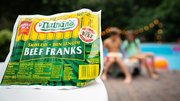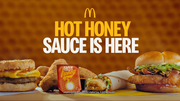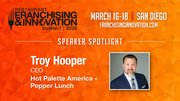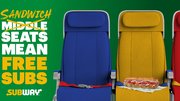Blog
McDonald's, Coca-Cola in the middle of Olympic tug-o-war
Support for athletes outweighs negative perceptions.
July 12, 2012 by Alicia Kelso — Editor, QSRWeb.com
The same drum has been beating for quite some time now: Some people don't like the idea of McDonald's having to do with anything considered "nutritional," "healthy" or "active." Thus, here we are at the center of another controversy in which a handful of groups are crying foul over McDonald's sponsorship of the London Olympic Games.
This is happening even though the London Games, which kick off at the end of July, mark the ninth consecutive Olympics that McDonald's has served as the Official Restaurant.
This is happening even though McDonald's has inked world-class Olympians such as swimmer Dara Torres and soccer player Julie Foudy to support its sponsorship.
This is happening even though McDonald's has one of the largest menus in the quick-service segment, including fruit and salads.
And this is happening even though McDonald's just launched a comprehensive program for children that encourages them to get active.
McDonald's isn't alone as the target of this latest protest. Coca-Cola is also under fire — the company that produces VitaminWater Zero and (perhaps most ironically in these circumstances) Powerade sports drink.
Some of the controversy began when a top doctor in Wales decried the brands' involvement in the Olympics. Dr. Tony Jewell published a total of three reports highlighting the obesity problem in Wales, asking for a ban on fizzy drinks (a la NYC Mayor Michael Bloomberg) and stating that McDonald's and Coca-Cola have no place in sporting events.
"As McDonald's prepare to open its largest restaurant in the world in the heart of the Olympic Park and sponsors Coca-Cola ramp up their advertising campaigns, I want us to consider the links between sports events, brands that promote fast food and drink, and our eating habits," he said.
He compared it to tobacco advertising. But perhaps he may be missing the point. Athletes — even the elite-level Olympians — likely consume McDonald's and/or Coca-Cola products occasionally. It's doubtful the same can be said of tobacco products.
No matter, Dr. Jewell's perspective was supported by many, including Paul Sacher, co-founder and chief R&D officer for a healthy lifestyle program in Wales, who said exposure to high-fat, high-sugar food and drink brand advertising could encourage overweight families to consume more.
Perhaps, however, overweight families who are watching the Olympic Games could be encouraged to get healthier. The conjecture could go either way.
Despite this latest finger wagging, not everyone wants to kick McDonald's and Coca-Cola out of the Games.
Dr. John Jewell, a lecturer in advertising at Cardiff University, said their sponsorship is necessary to provide athletes the money they need to perform at this level.
Additionally, the International Olympic Committee issued public backing of the two sponsors earlier this week. IOC President Jacques Rogge told Reuters the group "hugely values" the support of both companies.
"Both companies bring forward the spirit of the Olympic Games through creative and engaging global programs that promote physical activity and the values that the Olympic Games are all about," he said.
And even though McDonald's offers chicken snack wraps, and Coca-Cola sells Dasani water, both companies will be targeted again for their involvement in something else as soon as London's Closing Ceremonies are over. At the end of the day, though, it's hard not to support the companies that support the athletes we're all inspired to watch.
 ChatGPT
ChatGPT Grok
Grok Perplexity
Perplexity Claude
Claude








